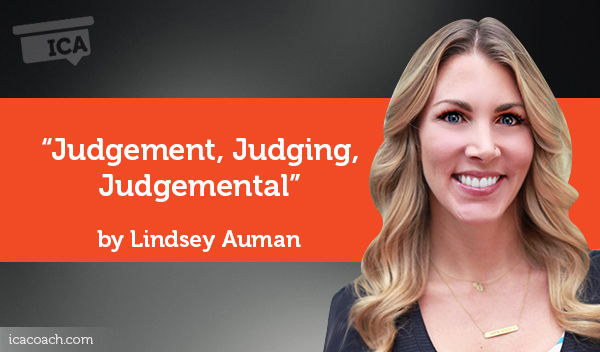
Research Paper By Lindsey Auman
(Life Coach, UNITED STATES)
What’s the difference? What’s good? What’s harmful?
judg·ment: noun – the ability to make considered decisions or come to sensible conclusions
judg·ing: verb – action of forming an opinion or conclusion about
judg·men·tal: adjective – having or displaying an excessively critical point of view1
Look up! Now! Look in front of you!! That car has slammed on its breaks and is starting to swerve on ice across several lanes of traffic and you are in danger! Quick! Make a decision. What do you judge is the right thing to do? Will you speed up to race in front of their sliding car? Will you swerve to the opposite side of the road? Will you slam on your breaks? What about the fact that your car needs the breaks checked? Is now the time to trust them? Or, what about the fact that your loved one is in the passenger seat, will you swerve your car so that your side is exposed to the dangerously out of control vehicle coming towards you – or will you swerve and put your loved one at risk? What will you do? What is your judgment call?
There isn’t a right answer here. Before the judgement is made, you don’t know the results of your decision. And in this particularly stressed and fast moment, your mind is likely to only be able to process a few of the available options before the judgement call must be made – else it is too late and a lack of judgment was actually your decision. Such is the challenge and beautiful truth of judgment – you don’t know if you’re right. You can’t disprove the other options, because you can only take one option. Applied to another person/day/scenario, the variables are different, even if subtly so, and thus the outcome of trying a different course of action – weighing a different judgment – cannot be deemed to be better or worse. It simply is what it is. It stands alone – it is your judgment for yourself and this set of circumstances in this moment of time. It’s one and done, and then it’s gone.
That’s not to say that the lessons that you’ve learned from exercising actions based upon your jugement in your past will not be excellent tools for the later judgments you must make. You had a failed marriage and in looking back, you can now see red flags that you were completely blind to before you were engaged – those are new pieces of information you will use in future judgments. They aren’t lost lessons. Each judgment leads to a lesson which will impact your ability to make later judgments.
Most parents will say that they hope that their lessons learned will help their children make better decisions for themselves. These parents will tirelessly share with their children their lessons – hoping to impact their childs judgment. The child may choose to apply some of that parental wisdom, or perhaps to throw it all out the angsty window of self-discovery. That is them exercising their judgment – weighing the information available to them and making their decision, for themselves.